Posted by Elena del Valle on June 16, 2025
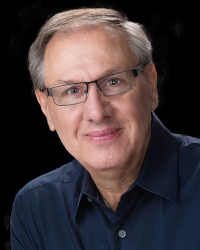
Tony D’Urso, author, Imen of Atlantis Bitten
Photo: Tony D’Urso
A podcast interview with Tony D’Urso, author, Imen of Atlantis Bitten, is available in the Podcast Section of Hispanic Marketing and Public Relations, HispanicMPR.com. During the podcast, he discusses how he became a fiction writer with Elena del Valle, host of the HispanicMPR.com podcast.
Tony is host of The Tony DUrso Show, a podcast that according to his bio “has amassed over 45 million downloads” in seven years. His fiction novel, The Imen of Atlantis: Bitten is set in a mythical land inspired by ancient maps of the Arctic. The book explores a powerful race of beings with extraordinary abilities, whose existence sparks a dangerous greed for gold and power among humans.
To listen to the interview, scroll down and click on the play button below. It is possible to listen by looking for “Podcast” then selecting “HMPR Tony D’Urso” and downloading the MP3 file to your audio player. You can also find it on the RSS feed. To download it, click on the arrow of the recording you wish to copy and save it to disk. The podcast will remain listed in the June 2025 section of the podcast archive.
Posted by Elena del Valle on June 2, 2025
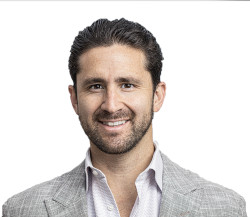
Eduardo Sigal, author, Resisting Recession
Photo: Eduardo Sigal
A podcast interview with Eduardo Sigal, author, Resisting Recession, is available in the Podcast Section of Hispanic Marketing and Public Relations, HispanicMPR.com. During the podcast, he discusses how to master the real estate mindset with Elena del Valle, host of the HispanicMPR.com podcast.
Eduardo is a seasoned real estate investor and entrepreneur. His philosophy focuses on stable income, dependable cash flow, and economic strength, particularly in uncertain economic times. Drawing from decades of family expertise and his own successful career, he seeks to empower investors to build resilient, intergenerational wealth. As the founder of Signet Investments and host of The Signet Podcast, Eduardo champions a long-term approach that “prioritizes safety, growth, and sustainability, offering strategies for thriving amidst market volatility.”
To listen to the interview, scroll down and click on the play button below. It is possible to listen by looking for “Podcast” then selecting “HMPR Eduardo Sigal” and downloading the MP3 file to your audio player. You can also find it on the RSS feed. To download it, click on the arrow of the recording you wish to copy and save it to disk. The podcast will remain listed in the May 2025 section of the podcast archive.
Posted by Elena del Valle on May 12, 2025
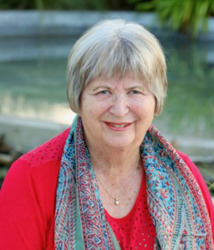
Janet Levine, author, Liv’s Secrets
Photo: Janet Levine
A podcast interview with Janet Levine, author, Liv’s Secrets, is available in the Podcast Section of Hispanic Marketing and Public Relations, HispanicMPR.com. During the podcast, she discusses her book with Elena del Valle, host of the HispanicMPR.com podcast.
A South African born American author, activist and entrepreneur Janet is the author of six books including Inside Apartheid and the Ennegram Intelligences. Her works have been nominated for the Grawemeyer Education Award and the 2023 National Book Award in Fiction. A seasoned journalist she has contributed to The New York Times Magazine and The Yale Review, and she has reviewed books for the New York Journal of Books.
To listen to the interview, scroll down and click on the play button below. It is possible to listen by looking for “Podcast” then selecting “HMPR Janet Levine” and downloading the MP3 file to your audio player. You can also find it on the RSS feed. To download it, click on the arrow of the recording you wish to copy and save it to disk. The podcast will remain listed in the May 2025 section of the podcast archive.
Posted by Elena del Valle on September 11, 2024
We have not used AI-assisted technologies in creating this article.
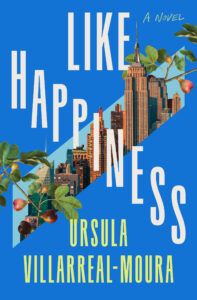
Like Happiness
Photos: Celadon Books, Levi Travieso
For readers hungering for something a bit out of the ordinary Ursula Villarreal-Moura wrote Like Happiness (Celadon Books, $28), her first novel. The book explores the complexities of gender and power by examining a young woman’s destructive relationship with a well known writer. Set in 2015 in Chile, where Tatum Vega and her partner Vera lived, the story is narrated in the present and a past 10 years earlier, which Vega would rather forget. Accusations against the author with whom she had a relationship in the past force her to examine her history with the author and its lingering impact on her life.
The author answered questions by email via her publisher Celadon Books.
HMPR: What would you say is the primary target audience for the book?
UVM: I don’t know if there is one set target audience. The people who have reacted most positively describe themselves as 1) fans of thrillers, 2) readers of sad girl books, or 3) people fascinated with intersectionality and power dynamics.
HMPR: What did you mean by the title?
UVM: The protagonist of Like Happiness is infatuated with a book titled Happiness, so it’s a riff off that as well as an ode to her involvement with the book’s author.
HMPR: What made you choose the topic?
UVM: I was absolutely obsessed with the literary world and with power dynamics. I married those themes in Like Happiness and soon got sucked into that world.
HMPR: What do you think distinguishes your book from other titles?
UVM: I’ve been told it’s the nuance that makes it a different read. The main relationship lives in morally grey territory for quite some time. It’s also a Latinx book that doesn’t deal at all with immigration, or anything stereotypically considered “Mexican” or Latino. The main characters do ordinary things and just so happen to be Chicana and Puerto Rican.
HMPR: How will you measure success?
UVM: I’ve seen the book in multiple libraries, which means it’s available to people who might not be able to afford a hardcover. Like Happiness also has served as a bridge linking me with readers and other writers all over the globe. I consider those metrics of success.
HMPR: What is your next book project?
UVM: I’m working on another novel, a memoir, and possibly an essay collection. I never know which project I’ll complete next. It’s always a surprise. If readers enjoy Like Happiness, I also have a collection out titled Math for the Self-Crippling to hold them off until the next book.

Ursula Villarreal-Moura, author, Like Happiness
Villarreal-Moura was born and raised in San Antonio, Texas. She is the author of Math for the Self-Crippling, a flash fiction collection.
Comments:
Filed Under: Books
Posted by Elena del Valle on August 7, 2024
We have not used AI-assisted technologies in creating this article.
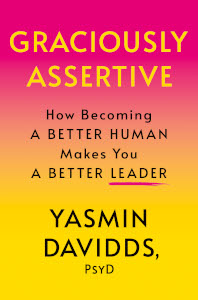
Graciously Assertive
Photos: Morehouse Publishing
Targeting an audience of women leaders Yasmin Davidds, Psy.D., founder, Multicultural Women Executive Leadership Foundation, wrote Graciously Assertive: How Becoming a Better Human Makes You a Better Leader (Morehouse Publishing, $23) as a handbook for them to become gracious and bold. The 235-page hardcover book was published this year. It is divided into 10 chapters. She promises readers that with the insights she shares they “will learn the balance required for effective leadership, self-advocacy, and communication, all while be respected, well-liked, and successful.”
When asked how she defines graciously assertive she replied via a email through her publicist: “‘Graciously Assertive’ is a communication style that combines assertiveness with graciousness. It allows you to express yourself in a way that fosters understanding, empathy and respect. It ensures that all parties feel seen, heard and included. It not only champions self-advocacy, but also enhances relationships, making every conversation a pathway to mutual success and understanding. Using the Graciously Assertive communication style not only changes outcomes, it changes lives, by embedding empathy and respect in the bedrock of every interaction.”
How does the leadership style and its pillars fit in with this era where many are brazenly breaking the rules and think they’re getting away with it? The author replied, “Let me begin by stating that there must be a conscious desire and effort made by a leader to evolve and grow. If the leader is in denial or is invested in maintaining a toxic culture, there is no leadership style that can help them.
However, if there is a conscious desire to evolve and grow, then there is hope for a better tomorrow. In an era where many individuals and leaders may seem to be breaking the rules and operating with a sense of impunity, the ‘graciously assertive leadership style’ and its eight pillars provide a much-needed framework for promoting ethical behavior, emotional intelligence, and compassionate interactions.”

Yasmin Davidds, Psy.D.
She said that “When life presents challenges to women, they often react in two possible ways: some withdraw and become fearful and timid, others build hard impenetrable walls of protection.” She offers guidance on how women can balance effective leadership while at the same time being liked and respected. And that, “Graciously Assertive Communication is the ability to communicate in a way that is firm and direct yet kind and respectful of feelings and needs of others.”
According to her biography Davidds, a San Diego, California resident, founded the Multicultural Women Executive Leadership Foundation, launched the Women’s Institute of Negotiation and established the Dr. Yasmin Davidds Leadership Institute.
Comments:
Filed Under: Books
Posted by Elena del Valle on June 20, 2024

Thirst cover
Photos: Dutton, Anita Bugni
This year Dutton released Thirst (Dutton, $28), a 241-page hardcover fiction title, in English and Spanish in the United States. Written by Argentina born Marina Yuszczuk the vampire horror novel is set in early colonial Buenos Aires, Argentina. Heather Cleary translated the book. The author replied to questions by email via her publishing company publicist. The translator replied to questions via email.
When asked, with so many vampire novels already in print what inspired her to write Thirst she replied: “Well, precisely: I was inspired by thirst, which is endless. I had the desire to write about a vampire when an image materialized in my mind. I sensed I could bring a new perspective because this was a very specific image, set in Cementerio de la Recoleta in the XIXth century Buenos Aires. There are practically no vampires in the Argentinian literary tradition, and even horror is not a widely cultivated genre in my country. On another, more personal level, the urge to dive into such an erotic, sensual topic was irresistible.”
When asked about her primary target audience (in general, in the United States, and for the English edition) she replied: “First of all, I suppose, readers like myself who became fascinated with gothic literature as teenagers, who spent long hours of loneliness reading in their bedrooms with the door locked and developed a secret life, much like the heroes and heroines of gothic stories. I also believe—and this has been the case in Argentina—that Thirst is a vampire novel that can appeal to readers who are not used to reading vampire novels, or even horror. And I have to say, as I am myself a cinephile, I think this will appeal to horror movie fans, because vampire movies are in the very heart of Thirst.”
Regarding her biggest challenge in relation to the translation she said, “The biggest challenge in relation to the translation was getting editors in the US to read it, I guess! But that was my agent’s work, and she was brilliant. Then, of course, one aspect of the translation in which translator Heather Cleary and I worked very carefully was the specific scenario of XIXth century Buenos Aires with its particular mixture of colonial, French, and Italian architecture—a rather small town soon to become a modern, cosmopolitan city.”

Marina Yuszczuk
When asked about her goal and how she measures success she said: “I don’t think writers have goals other than to be able to keep on writing, and it is that necessity that makes us care about success, if we ever do. For me, success is the possibility to secure the writing of my next novel.”
Regarding next projects the author said, “I have already written two more novels after Thirst. One of them, Para que sepan que vinimos, was published in Argentina in 2022, and it’s a ghost story centered on the relationship between a grown-up daughter and her deceased mother. I just finished another novel, a gothic story set in a science museum in the last decades of the XIXth century.”
When asked “How did you decide on the cover art?” and “Who designed it?” she replied “The design team at Dutton did the cover art for the US edition, and I think it’s perfect—just the right mix of red, pink, the sensuality of the female body and the luxurious funerary art of past centuries.”
Yuszczuk, born in 1978, is founding editor of Rosa Iceberg, a press focused on publishing writing by women. She is the author of multiple books of poetry, short-story collections, and novels. She has a Ph.D. in literature from Universidad Nacional de la Plata and is a film critic for an Argentina newspaper. Thirst is her first book to be published in the United States.
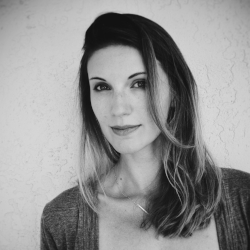
Heather Cleary
“The greatest challenge, which was also one of the things I loved most about translating Thirst, was creating two distinct voices—one is sensual, gothic, and grounded in the nineteenth-century, while the other is very contemporary and more cerebral, in the sense that the character is presented through her diary entries, where she explores her inner world in detail,” said Cleary when asked what the greatest challenge the translation posed. “Marina’s Spanish provided a crystal clear model for how this should work, but rendering these tones and atmospheres with the different set of linguistic tools that English provides required careful attention.”
When asked if translating Spanish from Argentina differs from Spanish from other countries she replied, “Yes, in the sense that Spanish is different from country to country (and within countries, for that matter). But no, in the sense that the process of translation, wherever the Spanish is from, involves first understanding those differences and working with that as a baseline. For this project, it helped that I lived in Buenos Aires for nearly two years—in the same neighborhoods frequented by the characters, actually—so it was easier to distinguish between expressions that are often used colloquially and phrases that diverge from typical speech and should be treated more poetically.”
When asked if there was something she liked or that stood out in particular she replied, “I love the complexity with which Marina portrays female desire, which includes sexual desire but also so many other forms: the desire for professional success, for solitude within the responsibilities of caregiving, for connection with family and friends, and so on. This, and the textures of the relationship between the modern narrator and her dying mother (and also her relationship with her young son), make this book truly exceptional.”
Cleary’s work has been recognized by the National Book Foundation and the Mellon Foundation. She teaches at Sarah Lawrence College. She is the author of The Translator’s Visibility: Scenes from Contemporary Latin American Fiction.
Comments:
Filed Under: Books
Posted by Elena del Valle on June 5, 2024
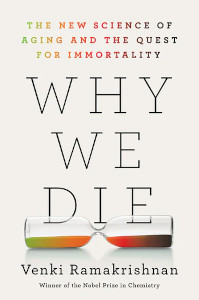
Why We Die
Photo: Harper Collins Publishers (William Morrow)
In Why We Die The New Science of Aging and the Quest for Immortality (William Morrow, $32.50) Venki Ramakrishnan, co-recipient of the 2009 Nobel Prize in Chemistry (for his work on the structure of the ribosome) and former president of the Royal Society, explores human mortality in a science and research oriented and thought provoking book.
In the book he asks what purpose we serve once we pass our reproductive years. Why do grandparents exist, he asks, for example. He explains that in the causes of aging known to date the processes are so interlinked and complex it’s difficult to separate causes and effects.
He wonders if living forever would be a good thing. He zeroes in on scientific research that has caught his attention from among many studies. And he presents the case that there would be social and ethical costs of attempting to live forever.
The 310-page book published in 2024 is divided into 12 chapters. Ramakrishnan leads the research team at the MRC Laboratory of Molecular Biology in Cambridge, England.
Comments:
Filed Under: Books
Posted by Elena del Valle on April 17, 2024
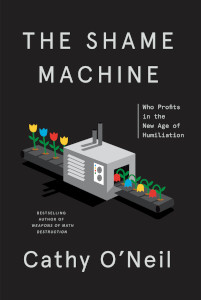
The Shame Machine
Photo: Penguin Random House
In The Shame Machine Who Profits in the New Age of Humiliation (Crown, $27), Cathy O’Neil, known for her previous book Weapons of Math Destruction, and Stephen Baker discuss their beliefs about shaming in society, especially via social media, and its effects on those targeted. The authors point to obesity, gender identity, possible body odor, addiction, poverty, political views, incels and hikikomori (a form of recluses in Japanese society) and age among the favorite subjects of those who shame people.
They say in that book that although shame may at times be used for social benefit, such as during the early years of covid to shame people into wearing masks and being vaccinated with an experimental vaccine, and to correct injustice; they believe it has increasingly become weaponized as a means to belittle the more vulnerable in society. They point to corporations, in particular Google and Facebook, and social media as the ultimate financial beneficiaries. In the case of hikikomori the financial motives may be less obvious although there are businesses dedicated to removing the recluses from the midst of their families, for a fee.
Most of us, the authors say in the chapter on humiliation and defiance, even if we are unaware, are likely to participate in shaming events. In the chapter on punching up they explain that punching up works when there is a choice and a voice. In that same chapter they explain that “shame is a toxin.”
They believe everyone should look at every aspect of life from the perspective of shame. They favor reparations for past wrongs. In lieu of shaming they propose an innovative approach to addiction: offering addicts a financial reward to visit methadone clinics; and giving money to the poor with no strings attached. A source of funding for these ideas was not evident.
The 255-page hardcover book published in 2022 is divided into 10 chapters in three main sections: Industrial Shame, Networked Shame and Healthy Shame. According the biography in the book O’Neil founded an algorithmic auditing company. In one case described in the book the work of her company (she was approached as an expert in “algorithms and crime risk scores) resulted in the release of a sexual predator convicted of raping an elderly woman. O’Neil wrote or co-wrote Doing Data Science and On Being a Data Skeptic.
Comments:
Filed Under: Books
Posted by Elena del Valle on February 7, 2024
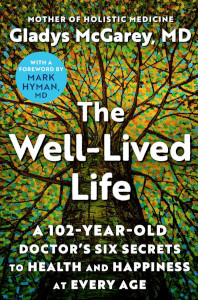
The Well-Lived Life
Photo: Simon and Schuster
India born Gladys McGarey, M.D., now 103, grew up to become a medical doctor in the United States. According to a recent article in The Wall Street Journal and her biography although she retired from her medical practice when she was 86 she continues to be a practicing doctor. Her biography indicates she lives in Arizona where she runs a life-coaching business. Last year she penned The Well-Lived Life A 102-year-old Doctor’s Six Secrets to Health and Happiness at Every Age (Atria, $27.99), a book about her life in which she shared some of the lessons she believes she has learned that may apply to readers.
According to the same Journal article she has been interviewed 200 times since May 2023. Someone managing her Instagram account appears to be active. A publicist, who responded via email, declined a podcast interview saying “her calendar is currently full for the time being” although no specific date was requested. The same publicist failed to respond to a recent request for the author to answer questions via email.
The 239-page hardcover book published last year is divided into six sections, one for each of the lessons. According to her book she believes readers should: have a purpose (she calls it juice) in life; keep moving through their lives; believe in the power of love; remember the importance of connectedness; learn from life experiences; and keep a positive attitude.
According to the website of The Foundation for Living Medicine (formerly, The Gladys Taylor McGarey Medical Foundation) the author sees patients one day per week and “She helps patients through difficult times with ‘life coaching,’ dream interpretation, and her own form of ‘Living Medicine.’”
Comments:
Filed Under: Books
Posted by Elena del Valle on January 10, 2024
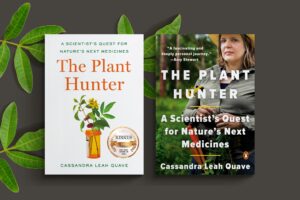
Photo: Cassandraquave.com
In The Plant Hunter A Scientist’s Quest for Nature’s Next Medicines (Viking, $27) Cassandra Quave, Ph.D., associate professor of dermatology and human health, Emory University, shares her life’s journey in pursuit of plants and their curative properties. Quave describes her growing years in Florida, including a childhood peppered with surgeries, her pursuit of an education meant to lead her to medical school and her charge of heart following an internship in the Amazon.
The 371-page hardcover book published in 2021 is divided into three main parts: Nature, Infection and Medicine. In its pages the scientist describes her marriage to an Italian man and the birth of three children, alongside studying for a postgraduate degree, her search for a steady income stream that resulted in grants and took her to Emory University where she also became herbarium curator.
Two attempts to reach Quave by email via her website and the publisher over weeks failed. She responded initially to a more recent message and has yet to reply for an interview request.
According to her biography she leads anti-infective drug discovery research initiatives and teaches courses on medicinal plants, food, and health; is the co-founder of PhytoTek LLC, “a drug-discovery company dedicated to developing solutions from botanicals for the treatment of recalcitrant antibiotic-resistant infections.” Her website lists, among other current and past funding sources, the National Institute of Health, National Eczema Association, United States Agency for International Development and The Coca Cola Company.
Comments:
Filed Under: Books























